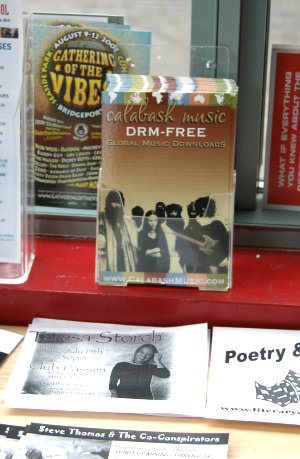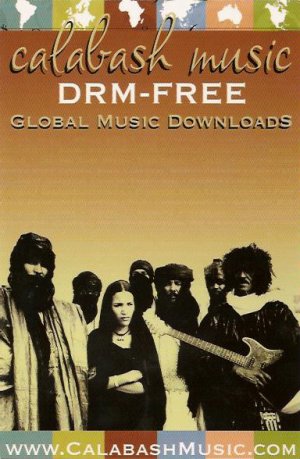Just a couple years ago, music and technology companies would advertise their DRM schemes. While these technologies only served to prevent users of computers and consumer electronics devices from doing things, the media and technologies companies tried to spin it positively. Think of all the wonderful media that the music, film, and publishing industries will be willing to distribute to you at the click of a button, they said. All they asked for in return is the keys to your computer and the legal right to attack and sue you if you try to take control.
As everyone who purchased iTunes music and made the mistake of buying a non-Apple DAP incapable of reading Apple DRMed music knows, DRM is a bad deal for consumers. Users are always better off with an unencumbered media file. In all the excitement over major label content, some consumers didn’t see this immediately.
With time though, the inconvenience of a computer that does the Apple and the RIAA wants over what you want hit home. This, combined with activist projects like the FSF’s Defective By Design, have turned the tide. The DRM label that used to be a badge of honor is now a stigma that smart companies are going out of their way to avoid.
This past weekend, I saw this flier from Calabash Music in the crepe store across the street:


The store served a general, non-technical audience. DRM-FREE, it turns out, is a good way to sell music. Not just to geeks but to any consumer who has been stymied unfairly by DRM or knows someone who has. That, it turns out, is a whole lot people. Consumers know what DRM is and they know don’t like it.
As consumers learn more about DRM, they want to avoid it. Seeing this, the companies that produce DRM are looking for ways to escape. The Apple/EMI deal seems to be an attempt to protect market share that the use of DRM is threatening. Others, like HBO’s Bob Zitter, are disingenuously attempting to escape the stigma of DRM by simply rebranding the technology.
Of course, DRM suffers from a much more fundemental problem than bad branding. The problem with DRM is that consumers don’t like what it does and are only sometimes willing to suffer through it when not given the choice. Increasingly often, as with in the example of the flier I found, consumers have a choice. Things don’t look good for DRM. For DRM opponents, the self-defeating nature of the technology is our greatest ally.
Where does it do that? I think he might have been exposed to the “Digital Restrictions Management” backronym a couple of times to read that into it. :)
In which case, we should backronymicize that in the same vein to “Digital Consumer Entrapment” or something similar.
Digital Consumer Entrapment: I love it.
And as for:
Users are always better off with an unencumbered MP3.
Did you mean:
“Users are always better off with an unencumbered OGG.” :-)
Scott: Indeed, I thought about adding that and didn’t. I’ll rephrase to not single out MP3.
DRM, the media companies say, ‘protects’ media? If that’s the case, then what has copyright been doing for the last 100+ years? Its still illegal to distribute unauthorized copies of most traditionally copyrigted media. DRM did not change that. Of course, we know it just restricts fair use.
FYI Links are backwards for the Calabash and Apple/EMI deal.
Do we need a trademarked name and logo for works and devices sold without DRM, so that the DRM vendors won’t start labeling “Digital Consumer Empowerment” products as “DRM-free”?
Thanks Pete! I fixed the links.
That DRM is becoming a stigma is fantastic, especially considering how quickly it has happened.
I’m interested in the mention of “a computer that does [what] Apple and the RIAA wants”. Let’s imagine you were appointed CEO of Apple in 2002, and your objective was to abolish DRM — not just keep to keep iPods free of DRM (FairPlay appeared in 2003), but to abolish DRM from the entire music industry as quickly as possible. What would you have done, in the past five years, differently from what Apple has actually done?
Keep in mind that during this period, (a) the major labels have been stupid, but have still produced most of the music that people want to buy, and (b) pushing them too hard would likely have driven them to abandon Apple and adopt Windows Media DRM exclusively.
I can think of one thing Apple could have done better: allowing independent artists to sell their music DRM-free through the iTunes Store from the beginning. Any others?
I’ve started seeing “DRM FREE” on pr0n sites as well. Not that I know anything about that :-*
mpt,
I’m not sure it’s quite accurate to say that “Keep in mind that during this period … the major labels have been stupid, but have still produced most of the music that people want to buy”. At least not if the implication is that without the major labels, this music would not have been made, or even that less music would have been made that people want to listen to.
The label system perpetuates an arms race in which those on whom more marketing money is spent become more popular. It’s also true that their music has something to do with it… but talented musicians have always found a way to make their music, and now they have a way to distribute it themselves too. So what happens if you put the question to yourself this way:
“Without the major labels, would anyone notice a shortage of music they wanted to listen to, or feel like something was missing from their lives?”
In the age of the Internet, it’s hard (for me) to imagine that the answer to that would be “yes”.
The labels don’t “produce” the music; the artists do. In the pasts, the artists needed the labels because distribution involved complex organizational requirements and economies of scale. That is no longer the case. So what exactly are the major labels producing for us, besides artificial scarcity?
The fact that the public is beginning to see freedom-from-DRM as a recognizeable benefit is, IMHO, a sign that they are realizing this too. After all, DRM prevented them from being participants in the distribution process, and they discovered that they missed it!
Karl, I wasn’t implying that without the major labels less or worse music would be made. I wasn’t considering the “Without the major labels” case at all, because it isn’t relevant to Apple’s DRM-related actions in the world that has actually existed over the past five years.
I agree that music labels are doomed. Apple probably knows this too. So they could have taken the eMusic route, kept DRM out of the iPod and the iTunes Store, and been as successful as — well — eMusic. But in the meantime, PlaysForSure-wielding and label-acquiescing music stores would have come to dominate the music downloads market (thanks to that marketing you speak of), eventually forcing Apple to license WMA and thus tithe to Microsoft for every iPod they sold. Not only would they make less money in that world than they do in this one, there would also be more DRM in that world than there is in this one.
Karl and all of you Apple fanatics. How is it that Apple leads the world in music distribution using DRM? Someone please explain how DRM is bad but Apple is good.
you kids are idiots. it has never been about consumers rights. funny how the guys who hate DRM are always soo full of smoke and indignation and the folk who like DRM focus on the business end of media delivery and what benefits DRM affords content owners- neither ever speak to the same arugment.
when has it ever, in business, been about what the consumer wants over what the owner is willing to sell? i got an apple, i bought it, ima eat it. all of a sudden i got this special apple, says only i can eat it but i can eat it as long as i want to, every day, 10x a day and it will still be whole and tasty every time i take a bite.
…but that jerk who sold me this magic apple, won’t let me take it out and let everyone eat it. like jeebus, i could feed the world with one apple…jerkguy says he wants to sell others the magic apple directly to people and actually charge them for it–pfft.. !!!I should be able to do what i want with this apple, share it’s goodness with anyone!!! i bought it right?! i’ mean, sure i have the sensibilities and business knowledge of a naive college freshmen..with no concept of work or working for my money- spoonfed spoiled little children are we. we want what we want! we want one apple for all, the folk who are trying to stop us are EVIL.
wake up younglings. since you’all have never had to make a dime on the internet and work the counter at blockbuster just so you can pirate your collection of DVD’s and games for free- you can go to hell cause your opinion does not count. you will never be in a position to make it count. you are a worker bee- buzz off.
we use DRM to protect our pr0n sites, using subscription and PPV models from a DRM provider. i laugh everytime i see jackholes who hate on the one thing that saved our industry from total pirated exploitation. Porn producers pay people to do it for money on video, no way we are going to continue to have surfers do it to us for free.
You have all lost- business won before it started. teh King ez dead, long live teh KingzorDRM…and hot dub penny action. LMK if you want some free passwords so you can actually check out DRM media- since i know none of you scrubs actually buy stuff on the web or contribute in anyway to business. no working retail is not really contributing.
Karl and all of you Apple fanatics. How is it that Apple leads the world in music distribution using DRM? Someone please explain how DRM is bad but Apple is good.